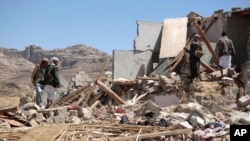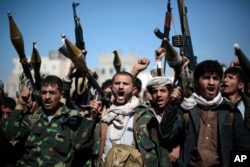The United States is considering deepening its role in Yemen's conflict by more directly aiding its Gulf allies battling Iran-aligned Houthi rebels, officials say, potentially relaxing a U.S. policy that limited American support.
The review of potential new U.S. assistance, which includes intelligence support, would come amid increasing evidence that Iran is sending advanced weapons and military advisers to the Houthi movement, a Shi'ite ally.
Any elevation in U.S. support could be seen as a sign that President Donald Trump's administration has made confronting Iran and its allies an early priority.
For the moment, however, any increase in direct U.S. assistance may be restricted to non-lethal measures and there was no sign the United States was considering waging strikes on Houthi targets, for example.
Trump's predecessor, Barack Obama, increasingly sought to limit U.S. ties to the civil war in Yemen and his administration became unnerved by civilian casualties caused by the Saudi-led coalition, which have come under intense international scrutiny.
Yemen's conflict has claimed the lives of more than 10,000 people and pushed the impoverished country to the brink of famine.
Critics of U.S. participation in the conflict, which has included arms sales to Saudi Arabia and refueling of Saudi-led coalition jets, say Washington carries some of the blame for the civilian fallout.
"The U.S. should not escalate our military involvement in a civil war in Yemen halfway around the world without any explanation by the president of what we are doing there and what is our strategy," said Representative Ted Lieu, a Democrat from California and a longtime advocate in Congress for a suspension of U.S. cooperation with the Saudi-led coalition.
Memo From Mattis
Trump's defense secretary, Jim Mattis, wrote a March memo to the White House advocating limited support for operations by Gulf partners, officials told Reuters, speaking on condition of anonymity.
One of the officials said the United States was examining offering the United Arab Emirates, for example, U.S. intelligence, surveillance and reconnaissance assets and information sharing.
The memo was first reported by the Washington Post and comes amid a broader U.S. review into its policy in Yemen, which for years has been seen almost entirely seen through the prism of America's fight against al-Qaida.
Al-Qaida's affiliate in Yemen, al-Qaida in the Arabian Peninsula, has taken advantage of Yemen's war pitting the Houthis against the Saudi-backed government of President Abd-Rabbu Mansour Hadi to try to broaden its wealth and power.
Iran rejects accusations from Saudi Arabia that it is giving financial and military support to the Houthis in the struggle for Yemen, blaming the deepening crisis on Riyadh.
But Iran's role in Yemen has increasingly been the focus of U.S. policymakers since the United States struck Houthi targets with cruise missiles in October in retaliation for failed missile attacks on a U.S. Navy destroyer.
U.S. officials say the Houthis have benefited from Iranian-provided know-how and weaponry, including ballistic missiles.
The proposed U.S. support could allow America to aid an eventual push on the western port city of Hodeidah, which is under the control of the Houthis.
It is near the Bab al-Mandab strait, a strategic waterway through which nearly 4 million barrels of oil are shipped daily.
Obama's administration was long wary of operations involving the port, given its strategic importance as a vital gateway for humanitarian supplies, and last year rejected a proposal to assist its Gulf allies in a push for the port.







